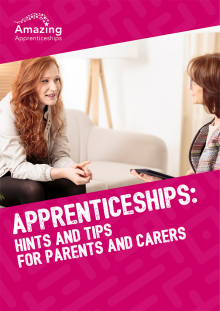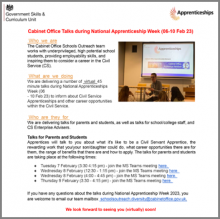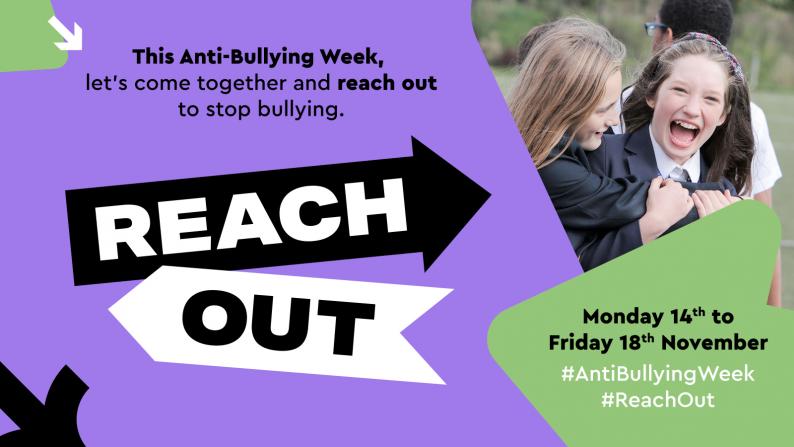National Careers Week 2024, 4-9 March 2024
Venerable Bede CE Academy is proud to once again support National Careers Week! See below for useful information and guidance about the various careers...

National Apprenticeship Week 2023 is the 16th annual week-long celebration of apprenticeships. The week brings together businesses and apprentices across the country to shine a light on the positive impact that apprenticeships make to individuals, businesses and the wider economy.
The theme for National Apprenticeship Week 2023 will be ‘Skills for Life’; reflecting on how apprenticeships can help individuals to develop the skills and knowledge required for a rewarding career, and businesses to develop a talented workforce that is equipped with future-ready skills.


How much do you know about apprenticeships? Test your knowledge with our fun quiz and learn a little more about what roles are available, when to apply, when companies advertise and what they might be looking for. Can you get 10/10?

Discover the amazing world of apprenticeships. Amazing Apprenticeships’ collection of short Apprentice Story films showcases the breadth and variety of apprenticeships, including Firefighting, Engineering, Broadcasting, Zookeeping and more. Apprentices are all around us, often working in surprising roles – watch our Apprentice Story films below to be inspired.
Discover the amazing world of apprenticeships. Amazing Apprenticeships’ short film is a high-impact way to showcase the breadth and variety of apprenticeships. Apprentices are all around us, often working in surprising roles – watch ‘Apprentices are amazing’ to be inspired to find out more.
Use the below link to search and browse which apprenticeships are available based on your interest and location.



Your responses via this form continue to be incredibly helpful to our IT and Senior Leadership Teams who are working tirelessly to respond to each of them.
We ask you to be patient in awaiting a response as demand may be high. However, rest assured that each form submitted will be seen and responded to.
Scarlet fever is caused by bacteria, and although usually a mild illness, it should be treated with antibiotics to minimise the risk of complications and reduce the spread to others.
The symptoms of scarlet fever include a sore throat, headache, fever, nausea and vomiting. This is followed by a fine red rash which typically first appears on the chest and stomach, rapidly spreading to other parts of the body.
On more darkly pigmented skin, the scarlet rash may be harder to spot, but it should feel like ‘sandpaper’. The face can be flushed red but pale around the mouth.
If you think you, or your child, have scarlet fever:
You can find more information at www.nhs.uk/conditions/Scarlet-fever/
Chickenpox is usually a mild illness and children usually get better by themselves. Children with chickenpox should stay off school for five days from onset of rash and until all the lesions have crusted over.
You can find more information at www.nhs.uk/Conditions/Chickenpox/
Children who have had chickenpox recently may develop complications if they also catch scarlet fever.
Parents should remain vigilant for symptoms in children who have had chickenpox such as
If you are concerned about the symptoms above, please seek medical assistance promptly. If your child has an underlying condition which affects their immune system, you should contact your GP or hospital doctor to discuss whether any additional measures are needed.
High temperature is also common in children with infections including COVID-19. If your child experiences a high temperature (fever) or any of the other main symptoms of COVID-19 (new continuous cough and/or loss or 71 shares change to sense of smell or taste) your child should stay at home and avoid contact with other people. High Temperature (fever) in children.
Advice on what to do if you think your child has COVID can be found here: https://www.nhs.uk/conditions/coronavirus-covid-19/self-isolation-and-treatment/when-to-self-isolate-and-whatto-do/
Further information about how to manage fever in children can be found here: https://www.nhs.uk/conditions/fever-in-children/.
The spread of most infectious illnesses is reduced through good hand hygiene. Please help your child to wash their hands frequently with warm water and soap, particularly after using the toilet, after using a tissue to catch a cough or sneeze, and before eating.
Particular care should be taken when handling nappies or tissues.
Any soiled clothes, bedding and towels should be washed on the hot cycle of a washing machine and where possible cups, utensils, towels and bedding should not be shared.
If you are concerned about any of the information in this letter or would like to discuss it further, please contact the team on 0300 303 8596.
Yours sincerely,
North East Health Protection Team

We have, once again, been nominated by Sunderland Music Hub to become a Music Mark school for the 2022/23 academic year. We have been recognised for our commitment to a broad and balanced curriculum and the value that we place on music, and as a result, we have been nominated to become part of the Music Mark community.
Mrs Bonner, Head of Music, said “It’s great to receive this positive recognition – especially considering the difficulties we’ve faced as a subject during the pandemic. The peripatetic team have done everything possible to help keep music active and raise it’s visibility and importance in the school curriculum. We are looking forward to a busy festive period this year where we can once again welcome live audiences to celebrate the true meaning of Christmas and join in community singing.
As a department, we have approximately 25% of the school population engaged in small group singing and instrumental tuition on a weekly basis and run several after school clubs from rock bands to singing clubs. We have had a number of pupils sit their external ABRSM and Rockschool instrumental singing exams over the last 2 years, both remotely and face to face, and received some amazing results. The music staff have worked collaboratively to get involved in every opportunity to keep music alive in school, pre-recording performances for services and Christmas events. I am so proud to work with such a talented and committed team of peripatetic staff.”



| Monday 14 |
|
| Wednesday 16 – During PD Lesson |
|
Anti-Bullying Lesson PowerPoint

Venerable Bede CE Academy is proud to once again support National Careers Week! See below for useful information and guidance about the various careers...
Venerable Bede CE Academy is proud to once again support National Apprenticeship Week! National Apprenticeship Week 2024 is the 17th annual celebration of apprenticeships....